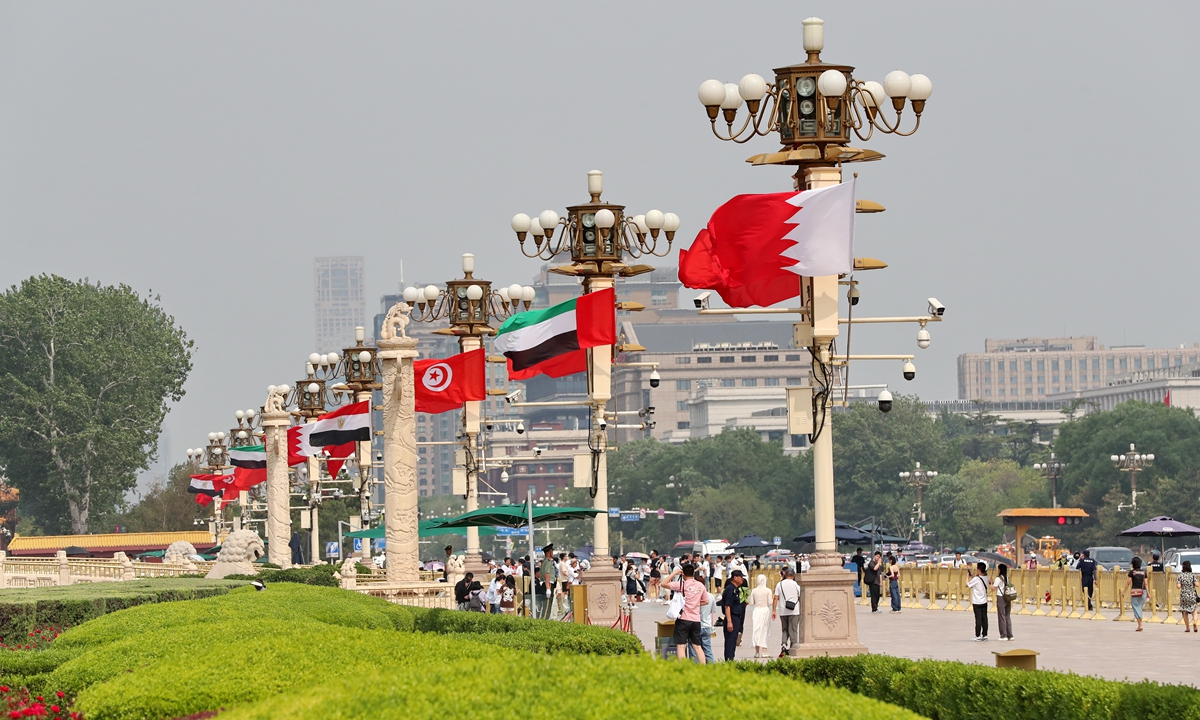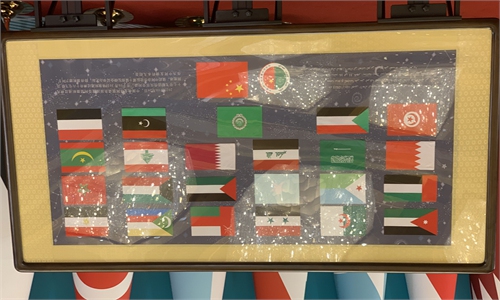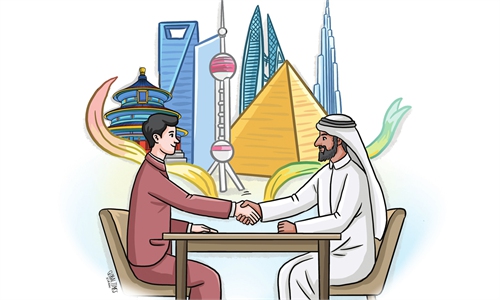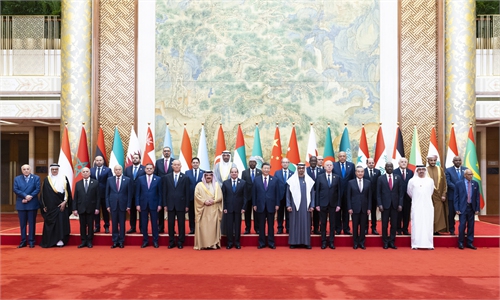China-Arab community with a shared future provides a vivid annotation for peace, devt: Global Times editorial

Flags hang in Tian’anmen Square on May 29, 2024 to welcome Bahrain’s King Hamad bin Isa Al Khalifa, Egypt’s President Abdel Fattah El-Sisi, Tunisia’s President Kais Saied, and United Arab Emirates’ President Sheikh Mohamed bin Zayed Al Nahyan on their state visit to China. Photo: VCG
On Thursday morning, Chinese President Xi Jinping attended the opening ceremony of the 10th ministerial conference of the China-Arab States Cooperation Forum (CASCF) and delivered a keynote speech. In his speech, President Xi expressed his willingness to continue promoting "leapfrog growth" of China-Arab relations, and announced that China will host the second China-Arab States Summit in 2026, which is "set to be another milestone in China-Arab relations." There is no doubt that the China-Arab community with a shared future is making rapid progress in the new era, and the enthusiastic applause at the scene was the most genuine response from the Arab countries. For the peace and stability of the world, the political, developmental, security, and civilizational consensus between China and Arab countries also provides profound insights.
What does the China-Arab community with a shared future look like? In his speech, President Xi outlined its blueprint from four directions: a model for maintaining world peace and stability, a fine example of high-quality Belt and Road cooperation, a paradigm of harmonious coexistence between civilizations, and a model for promoting good global governance. This represents a brand-new mode of interaction that has never existed in the Middle East before. It will write a vivid footnote for peace and development on this land that is often caught up in turmoil. If there is anything that could be considered a "secret" transcending geopolitics, it is the message that China sincerely shares: solidarity and mutual assistance, equality and mutual benefit, inclusiveness and mutual learning, and close cooperation.
Currently, China-Arab relations are at their best in history. China has established comprehensive strategic partnerships or strategic partnerships with 14 Arab countries and the Arab League, making the Arab world a region with a high concentration of China's strategic partnerships. The China-Arab community with a shared future is tangible and visible. At the first China-Arab States Summit in 2022, President Xi put forward "eight major cooperation initiatives" for practical cooperation. In just over a year, these initiatives have achieved significant early results in fields such as technology, trade, energy, and people's livelihoods.
At this meeting, both sides signed cooperation documents such as the Beijing Declaration and the CASCF execution plan for 2024-2026. These documents include the review of the progress in implementing important consensus and outcomes of the first China-Arab States Summit, as well as the plans for strengthening the forum mechanism over the next two years. They also address various concerns of public opinion regarding this meeting and highlight the future direction of China-Arab cooperation.
It is worth mentioning that, based on the "eight major cooperation initiatives," China has proposed the "five cooperation frameworks," including innovation, finance, energy, economy and trade, as well as people-to-people exchanges, with the first four all related to new quality productive forces. It is not difficult to see that building a China-Arab community with a shared future is also a fast lane toward the future and achieving modernization of each country. This is particularly significant for South-South cooperation, which takes the pursuit for modernization as an important goal.
The Middle East is a fertile land for development, but conflicts continue to rage on this land. Since October last year, the Israel-Palestine conflict broke out again, causing a large number of innocent civilian casualties and leading to a severe humanitarian crisis. Any country or people who love peace cannot remain indifferent. The Palestinian issue is also an important topic of discussion at this ministerial meeting. During the meeting, President Xi pointed out that China firmly supports the establishment of an independent State of Palestine that enjoys full sovereignty based on the 1967 borders and with East Jerusalem as its capital. It supports Palestine's full membership in the UN, and supports a more broad-based, authoritative and effective international peace conference. At the same time, China and Arab countries jointly issued a joint statement on the Palestinian issue, which is an important consensus between China and Arab countries on the Israel-Palestine issue.
In the 20 years since the establishment of the CASCF, despite the Middle East experiencing major changes such as the Iraq War, and the "Arab Spring," the CASCF has been able to weather the storms and demonstrate increasingly strong vitality and appeal. There is every reason to expect that the second China-Arab States Summit and future more institutionalized arrangements between the two sides will provide more stable and powerful support for peace and development in the Middle East. The deepening of China-Arab cooperation will also continue to prove that the "geopolitical chessboard" and "powder keg" are not the fate of this region.
It should be pointed out that China-Arab cooperation is not directed against third parties and is not exclusive. With the advancement of building a China-Arab community with a shared future, the peace dividends and development dividends it brings to the Middle East will become more apparent. During this process, we welcome countries that uphold the same values to participate, as this will undoubtedly contribute to global peace and stability.
The road of collective cooperation between China and the Arab countries has already shown a powerful force that has amazed the world, and the construction of a China-Arab community with a shared future has opened a new era, making the future of China-Arab relations promising. We look forward to the two great ancient civilizations of China and the Arab countries continuously creating more miracles in the new journey of building a community with a shared future, benefiting their respective countries and peoples, and contributing to world peace and development.



